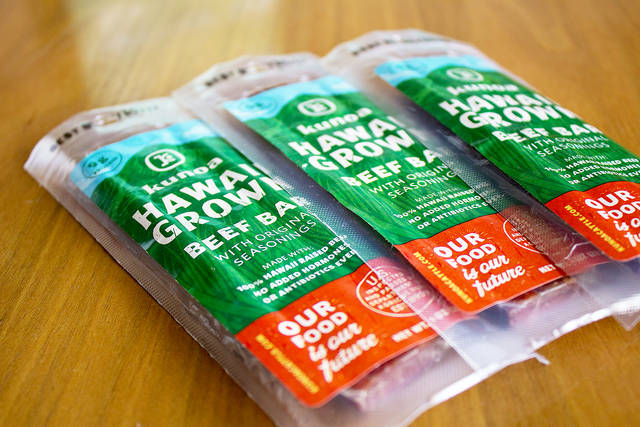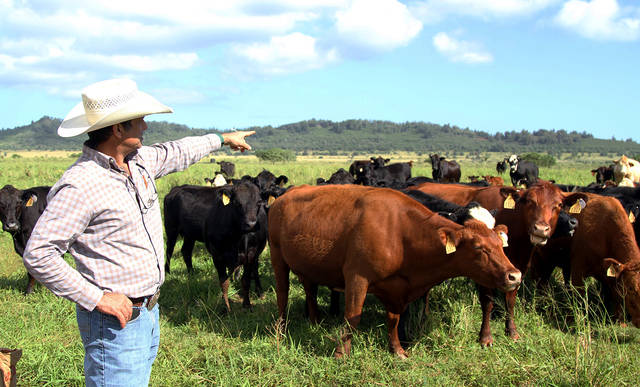Bobby Farias is a betting man, and he’s betting consumers will continue to love Kunoa’s Hawaii-grown beef.
“If the consumer chooses local, then local wins. Period. If we bet on ourselves, we will win,” he said. “That’s all we can do.”
Kunoa co-founder Farias, a third-generation Hawaii rancher, was recently promoted to president from chief operating officer, where he will oversee all aspects of the company’s operations and strategic vision.
Co-founder Jack Beuttell is transitioning out of his role as CEO to focus on enhancing investor relationships and key partnerships in support of the company’s planned growth.
“Our new team members bring decades of professional experience, industry know-how and heart to our operations,” Farias said. “In 2019, we will see greatly expanded Kunoa product availability and partnerships throughout Hawaii, while continuing our focus on healthy land, animals and communities.”
Kunoa is also increasing its Kauai ranch operations with the lease of an additional 1,700 acres of land. This will allow the company to double its current herd size of 2,000 cattle and expand relationships with grocers, restaurants and retailers.
Farias is “very positive” about the future of his industry. He likes that there’s nothing fickle about it. Beef isn’t a trend or a craze. It’s long been part of America’s diet and likely always will be for one reason: Beef is what millions of people want.
“This is a consumer-driven business,” he said. “We like it that way. We want it to be that way.”
Its success does not hinge on “some scientific widget. This is not a fad, this is a necessity,” he said.
Kunoa, a Hawaii cattle company and livestock processor, recently announced an expanded executive team that brings decades of combined industry experience to the company’s operations.
Aaron Cates will serve as chief financial officer, Emi Kowalczyk as director of operations, and Bryan Mayer as director of product.
Kunoa continues its growth after purchasing Oahu’s only USDA-inspected livestock harvest facility in November 2016. In the past year, Kunoa has increased its staff by more than a third to 45 total employees, providing much-needed career opportunities in West Oahu.
The company is also supplying beef to Hawaii state Department of Education schools on Oahu and Kauai through Dec. 31, 2019, under a new distribution partnership with Y. Hata.
Starting March 1, Kunoa has supplied half of all beef served in Oahu DOE schools. The company has met all beef needs for Kauai DOE schools since Jan. 1.
“The supply agreement marks a significant step forward for Hawaii schools in sourcing local foods for breakfast and lunch menus,” said a press release.
Kunoa will support efforts to help educate students and staff about Hawaii beef, as well as sustainable agriculture and ranching practices.
Kunoa was named a “Mana Up Hawaii Accelerator Cohort Company” in early 2018; an Energy Excelerator (EEx) Go-to- Market Cohort portfolio company; an EEx Fund One investment recipient; and is a Savory Institute Savory Hub candidate. Kunoa was also among six companies selected for the third cohort of the Food System 6 Accelerator Program.
Founded in 2014, Kunoa manages about 2,000 cattle across several thousand acres of land on Kauai and offers high-quality livestock processing through Oahu’s only USDA-inspected livestock harvest facility.
Selected by the nonprofit Savory Institute as a Savory Hub candidate in 2017 for the promotion of holistic land management in Hawaii, Kunoa (meaning “stand free”) promotes a food-secure future through a focus on healthy land, animals and communities.
Farias, with his promotion, has taken charge of the business aspect of Kunoa’s cattle operations, driving growth and seeking new opportunities.
There’s a lot out there because people are eating meat.
According to globalagriculture.com, consumers ate, on average, about 220 pounds of red meat and poultry in 2018 up from 216.9 pounds per person in 2017. They are expected to eat even more this year.
“The predicted increase is ending a trend of falling meat consumption that began with the Great Recession in 2008. In 2014, the consumption of red meat and poultry was still down at 201.8 pounds per capita before it started to climb steadily, reaching 211.1 pounds in 2015 and 214.6 in 2016,” globalagriculture.com reported.
Farias, a descendant of sugarcane plantation workers, admits he never thought his ranching career would evolve to being on the ranch less and in the office more. But it’s equally important to work on sales and development as it is to have great cattle.
“The business needs me to focus on building capacity of the plants and driving sales, so that the ranchers can continue to do what they do so well,” he said,
Ranchers, Farias said, are business men and women, “just like everybody else.”
“I’m in Honolulu more often than not now and I’m at the plant every day,” he said.
Farias has long been a cowboy, going back to when he was a boy. He competed in rodeos professionally for a time, was a champion team roper with his son, Robby, and they were good enough to win their share of prize money.
Rodeo life is, simply put, hard.
There’s no contract, so you’re on your own, week after week, traveling to compete. He noted that a small percentage actually earn money on the rodeo circuit.
“That’s how it is, a razor line of people make money in professional sports,” he said.
With cattle, it’s equally challenging to turn a profit but Kunoa does with a commitment to excellence, start to finish.
And leave no doubt, Farias knows cattle.
Growing up, his grandfather had cattle on Kauai, “a couple animals around to keep food on the table.”
What changed it to big business was when the sugar and pineapple industries started to falter. It wasn’t long before more land became available, and his family acquired what they could.
More land and more cattle led to growth.
For years, Farias operated the largest calf brokerage on Kauai, negotiating the sale and shipping of calves off island. He co-founded Kunoa to help keep beef, income and jobs on Kauai.
Today, Farias and Kunoa are careful to track what works and what doesn’t in sales, in branding, in building partnerships, in identifying customers.
“Connecting the product and the customer, that’s really our purpose,” he said. “If you don’t match the product to the customer, everybody is unhappy.”
Kunoa contracts to use cattle that makes the best beef possible. Toward that end, Kunoa uses specific grazing methods to produce the high-end beef that restaurants want.
Partnerships are also critical in ranching.
“I don’t try to just make a sale, but to build partnerships,” he said. “Those are the foundation of what we do. We all have to work together.”
At the end of each day, he loves what he does.
“I’m very proud of it. It’s been a life-long dream to be able to utilize more of our cattle here on Kauai,” he said.
•••
Bill Buley, editor-in-chief, can be reached at 245-0457 or bbuley@thegardenisland.com.






‘Land and Cattle’ businesses survive based on the value of the land that banks subsidize.
These “leases” are revokable and selling marginal ground beef to schools is really unethical. Based on recent evidence of toxins in the soil from years of chemical contamination in the lands…. until the Jones act is overturned, meat in Hawai’i is tough, grizzly and not proven to be free of chemicals…. it’s also to expensive and the local diners are closing their doors…